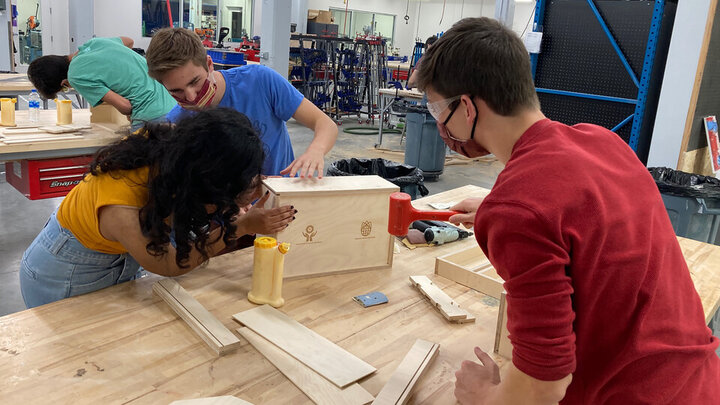Students, Innovation Studio team up to help Whiteclay Makerspace

In a small way, a group of University of Nebraska–Lincoln students and staff are helping Whiteclay, Nebraska, make a big change.
Through a partnership with Rotary International District 5610 out of southern South Dakota, staff from Nebraska Innovation Studio and students from the College of Engineering learning community, Engineering to Change the World, made 30 individual toolboxes for Native American artists who are utilizing the new and developing Whiteclay Makerspace.
Whiteclay Makerspace took shape in 2018, when a nonprofit was formed to purchase a former liquor store and make something good out of it. The tiny, unincorporated town of Whiteclay — population, nine — had gained infamy for its four liquor stores that sold 3.5 million cans of beer each year. Most of that alcohol was purchased by residents of the neighboring and officially dry Pine Ridge Indian Reservation across the state border in South Dakota. The Nebraska Liquor Control Commission revoked the liquor licenses of the four stores in 2017, effectively closing them.
With grants, community support and the leadership of Lincoln attorney Jon Ruybalid, the makerspace began to flourish. Rotary International District 5610 became involved in the project in 2019, when the group secured a $57,575 grant from the Rotary Foundation to help support the project. The mission of the grant was to help equip the new makerspace and its artists with equipment and supplies, and Rotarians reached out to NIS staff to see if they could help.
The toolbox project was nearly a year in the making.
“Over the last year or so, we’ve been in touch with the folks at the Rotary, offering to help in any way we could,” said David Martin, director of NIS and adviser to the learning community. “When they said they needed boxes for artists to store their supplies, I thought it would be a great project for the Engineering to Change the World learning community.”
Max Wheeler, NIS shop instructional technician, designed the toolboxes and cut the pieces from Baltic birch on the CNC machine. On a Saturday afternoon in October, 27 students constructed the boxes at NIS. It was one of the few times during the semester that the students could enjoy the company of one another in person — masked and socially distanced — and it was for a good cause, said Pooja Rajeev, a junior civil engineering major.
“We had a lot of interest from students in our community,” Rajeev said. “We have 49 members, so more than half came. We had hour-long shifts, and some students stayed the whole afternoon.
“It was fun to build the boxes, using our hands, and it was related to what we’re learning in our engineering classes.”
Members of the Rotary Club are thankful for the work of NIS staff and students, and are hoping they can work with NIS again.
“David and his team took our little idea and they just flew with it,” said Linda Peterson, a Rotarian from Rapid City, South Dakota. “They sent a sketch and we asked for a handle and lid to be added, and then we got a fabulous picture of all those boxes and we were thrilled.”
The toolboxes will be delivered to Whiteclay Makerspace when it is safe, as the COVID-19 pandemic has closed the reservation to visitors. Currently, the pandemic is keeping the doors to the makerspace shut, but artists are still busy and are selling their works online through the Whiteclay Makerspace website. The proceeds go to the artists, except 12%, which is given back to the Whiteclay Makerspace nonprofit organization to help offset costs of running the makerspace.
